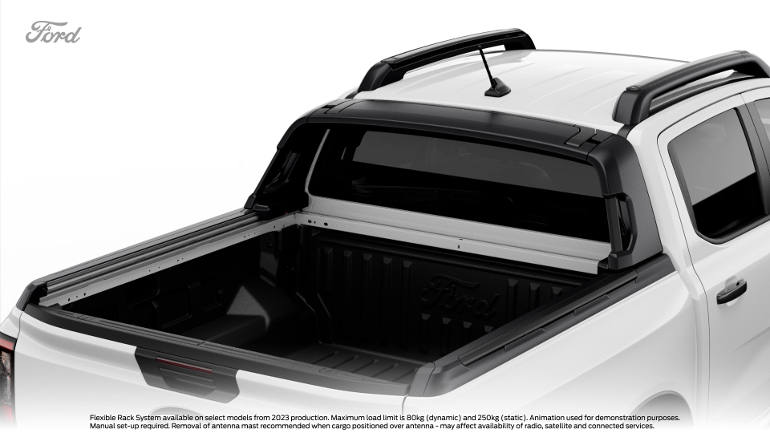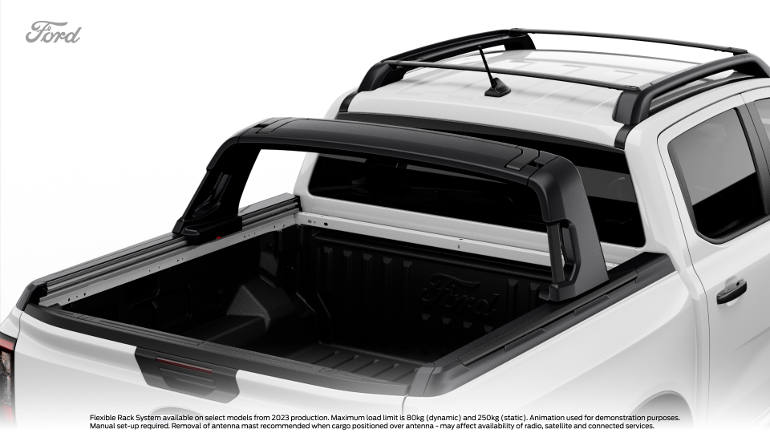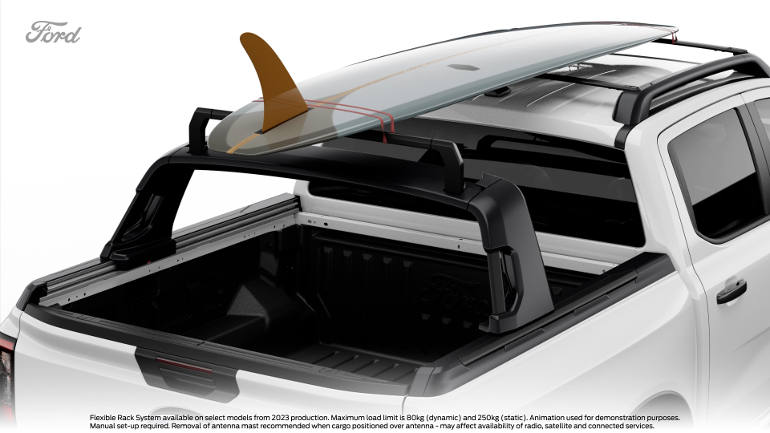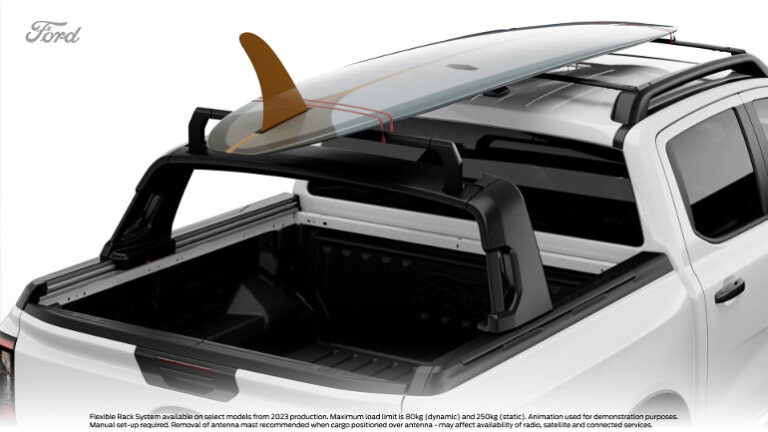We couldn’t believe this video when we saw it. A problem that has remained unsolved for decades. How do you make roof racks look cool while being practical? A system that adapts to the demands of a Tradie, while meeting the style requirements of the Toorak Tractor driver with the big wheels and chunky mud-terrain tyres.
Watch the video. It gets our vote for Product of the Year.
Ford have solved this problem with a roof rack package for the new Ranger that is the most versatile ever and it’s about to make carrying longer items much easier. Whether it’s a ladder, timber, a door, canoe, surfboards or bicycles, Ford’s unique Sliding Load Rack and Folding Roof Rack allow owners to load items spanning the length of the roof and load box. Together they’re known as the Flexible Rack System (FRS) 1.
Developed by a team of Ford Australia Special Vehicle Engineers in collaboration with JAC Products, and with patents pending on the design, the Sliding Load Rack can be operated by just one person. It slides within a C-shaped channel mounted to the top of the load box sidewalls and can be locked in five different positions allowing for the secure support of different length items. A pop-up crossbar increases the height of the loading platform to match the Folding Roof Racks.
Ranger’s clever Folding Roof Racks feature crossbars that can be adjusted into two different positions and then stowed away within the roof rails when not being used.
“The Flexible Rack System redefines how customers can use their Next-Gen Ranger and is just another example of Ford’s ingenious design features on Next-Gen product,” said Nik Tibhuvan, senior engineer, Special Vehicle Engineering. “Both can be operated easily by one person and have been put through a lot of the same durability testing as Ranger itself.”
Built for Work, Family and Play
Early in the development of Next-Gen Ranger, Ford met with pickup owners and learned how they used their trucks. It was during these clinics the team determined a need for a feature like the FRS.
“We learned from our customers that they would load things like canoes into the load box and then lean them up against the sports hoop before tying them down. This was awkward and meant the load box couldn’t really be used for storing anything else a customer might want to take with them,” said Danny Trentin, application specialist, Ford Ranger.
“We also learned of their frustrations when it came to carrying items of longer lengths. With an 80-kilogram dynamic load limit, the Flexible Rack System eliminates those frustrations,” he said.
Designed to fit
As an item that can be moved along the load box, the Sliding Load Rack had to look like it belonged no matter where it was positioned, said Max Tran, chief designer, Ford Ranger. So, Ford created a design that allowed it to sit within the profile of the vehicle.
“We wanted the Sliding Load Rack to ‘belong’ on Ranger, no matter where it was positioned,” said Tran. “It needed to be functional, of course, but it also needed to match and complement the shape of Next-Gen Ranger while being user friendly and as quiet as possible when deployed.”
Engineered for purpose
When it came to operating the Sliding Load Rack, the team wanted it to be something one person could position easily and quickly and that, once deployed, in one of the five defined locking points would be rock solid.
Unlocking the Sliding Load Rack on one side automatically releases it on the other side, allowing the hoop to slide easily in the rails. A system of four roller bearings angled at a precise 37-degrees, retractable stabilisers and locks ensure easy movement when unlocked but prevent the Sliding Load Rack from moving when locked in position.
Because the cabin and load box of a pickup move independently of one another, the team engineered the Sliding Load Rack with a degree of compliance which means the 80-kilogram dynamic load limit applies on and off-road, while the static capacity is rated at up to 250-kilograms.
Torture tested
It was important that as well as being easy to use and looking good, the FRS was robust. This meant torture testing it like we did with Ranger, said Tribhuvan.
The team developed an 80-kilogram platform that could be adjusted to different lengths to match the five different lockable positions along the load box and then subjected the FRS to many of the same durability tests as Ranger itself.
“Part of our durability test involves our infamous Silver Creek Road test track which is so torturous we use autonomous driving robots to complete this phase of the testing. The FRS was tested at full load and completed 77 runs on the track, passing with flying colours. It completed 400 runs with no load,” said Tribhuvan.
Fragile loads were also secured to the Sliding Load Rack. The vehicle and ‘fragile load’ were then repeatedly run across smooth and uneven surfaces, twist ditch and gutters to ensure the system worked with a variety of solid and delicate loads.
The Sliding Load Rack not only had to be strong, but it also had to handle everything the outdoors could throw at it. “We tested the system with bulldust, red dirt, salt and water, to replicate the sort of real-world grit and muck owners will encounter,” said Tribhuvan.
Once covered in filth, the Sliding Load Rack was cycled more than 3500 times to replicate approximately 10 years of use. Cleaning of the system is made easy with drainage holes in the track which allow owners to simply wash the channel with a garden hose.
The Ford-exclusive Flexible Rack System will make its market debut on select Ranger models in 2023.









